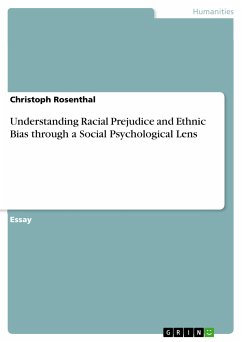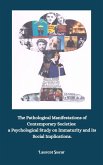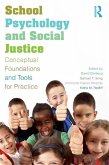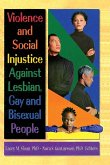Essay from the year 2013 in the subject Psychology - Social Psychology, grade: Distinction, London School of Economics, language: English, abstract: On February 26, 2012 neighbourhood watch volunteer G. Zimmerman from Sanford, FL fatally shot unarmed Trayvon Martin, a 17-year old black teenager. The eventual acquittal of Zimmerman sparked fundamental debates about racial profiling and civil rights, polarizing nations and different interest groups in an argument about the possibility of a racialized shooter bias. A similar case in the US from 2001 revolved around the killing of West-African immigrant Amadiou Diallo, who had been shot 41 times by police after reaching for an object which turned out to be his wallet instead of a gun. Whereas prosecutors and spectators in favour of the victims claimed racism to be the root of such tragedies, the opposing camp argued that prosecuting the shooters would have been a travesty, absurdly and falsely representing self-defence. Though most common in judicial situations, such as the shootings of Trayvon and Amadiou, racial profiling can be defined as encompassing any form of discrimination based on stereotypes, ethnic bias or prejudice about race and skin colour. Racial bias manifests in negative repercussions for black individuals in a variety of ways, for example in education, recruiting and the workplace, health care, court room decisions and the promulgation of the death penalty. Omnipresent and deeply entrenched in historical, ideological and socio-political contexts, racial prejudice, ethnic bias and socially created stigma of belonging to an ethnic minority comprise social phenomena whose thematisation and understanding are of paramount importance. After providing a comprehensively integrated and analytical discussion of social representations theory, attitudes research and social identity in terms of race and prejudice, I will draw on a 45-minute open personal interview with a 22-year old American woman of Nigerian background to analyse some real-life experiences that exemplify the still occurring empiric manifestations of racism and prejudice. Arguing that these phenomena are fundamentally social, this essay achieves to tackle the societally relevant challenge of forging a better understanding of racial prejudice and ethnic bias towards black minorities by employing a
Dieser Download kann aus rechtlichen Gründen nur mit Rechnungsadresse in A, B, BG, CY, CZ, D, DK, EW, E, FIN, F, GR, HR, H, IRL, I, LT, L, LR, M, NL, PL, P, R, S, SLO, SK ausgeliefert werden.









